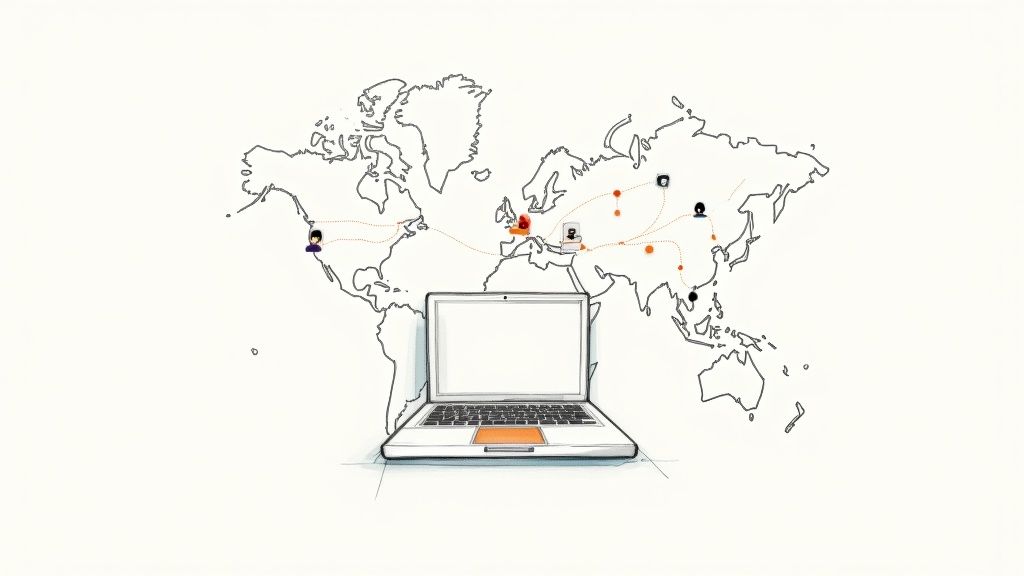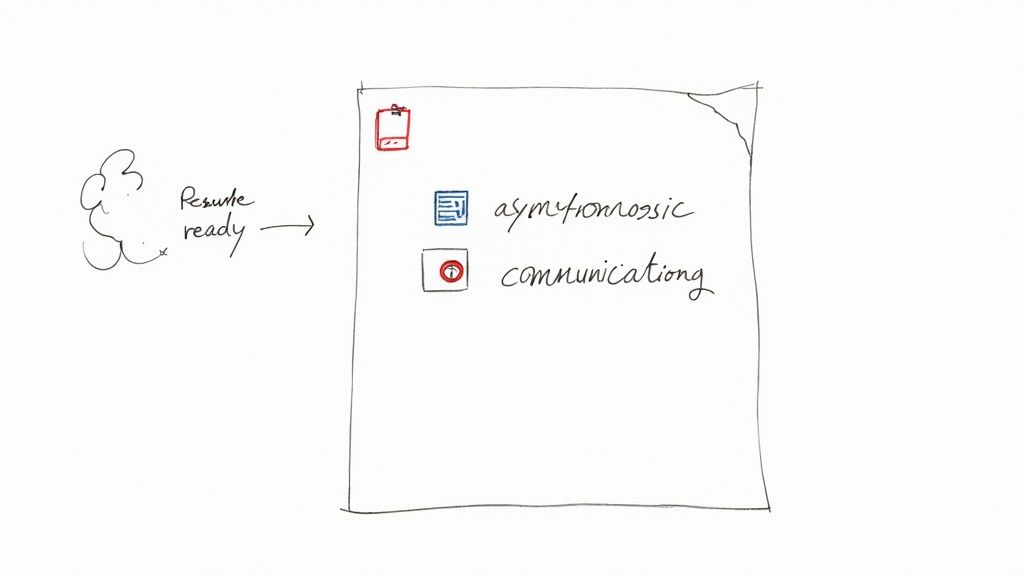Remote work from home jobs aren’t just about swapping your office desk for your kitchen table. They represent a fundamental shift in how we think about careers, offering a level of flexibility and autonomy that was once a pipe dream for most professionals.
Understanding the New World of Remote Work

Working from home has graduated from a temporary fix or a rare company perk to a permanent, powerful force in the global economy. As companies and employees have settled into this new reality, a whole new vocabulary has emerged. If you want to land the right role, you have to speak the language.
This is about so much more than your physical location. It’s a window into a company’s entire philosophy—how it operates, communicates, and builds its culture. The kind of remote job you take on will directly shape your daily routine, how you collaborate with your team, and even your long-term career path.
Decoding the Different Remote Models
Let’s get one thing straight: not all remote jobs are the same. Companies throw around terms like “remote-first,” “hybrid,” and “fully remote,” and each one signals a completely different work environment. Knowing the difference is key to finding a gig that actually fits your life.
To make sense of it all, here’s a quick breakdown of what these models actually mean for you.
Decoding Remote Work Models At a Glance
| Work Model | Primary Location | Flexibility Level | Best For |
|---|---|---|---|
| Remote-First | Anywhere | High | Self-starters who thrive on autonomy and digital collaboration. |
| Hybrid | Mix of home & office | Medium | People who want flexibility but still value in-person connection. |
| Fully Remote | Home | Varies | Individuals needing 100% location independence, but who are okay navigating a potentially office-centric culture. |
Understanding these distinctions will help you filter out the noise and focus on opportunities that align with what you truly want from a job.
The core difference really boils down to mindset. A remote-first company builds its entire DNA around distributed work, making sure everyone has equal access and opportunity. A hybrid or WFH-optional company might still have an office-centric gravity, which can sometimes create an unintentional divide between who’s in the room and who isn’t.
The Lasting Shift in Work Culture
This isn’t a passing trend. By 2025, it’s projected that over 32.6 million Americans will be working remotely, which is about 22% of the entire U.S. workforce. That’s a massive leap from the pre-2020 days when fewer than 5% of employees regularly worked from home.
We’re seeing a permanent change in how people balance their careers and their lives. People are leaving expensive cities for places with a lower cost of living, all without sacrificing their jobs. You can dive deeper into these employment shifts in our guide to current remote work trends.
This whole movement is fueled by a powerful demand for more flexibility and better work-life integration. Companies are getting the message, redesigning roles and adopting new tools to make distributed teams successful. For you, the job seeker, this means a world of opportunity has opened up—one where your talent matters more than your zip code.
Why Top Talent Demands Remote Work
The massive surge in demand for remote work isn’t just a passing phase—it’s a deep, fundamental shift in what professionals truly value. Sure, skipping the daily commute is a nice perk, but the real reasons go much deeper than that. Today’s best and brightest are looking for autonomy, real work-life integration, and the freedom to build a life they love, not just a career tied to a specific zip code.
This isn’t just about convenience anymore. It’s about control.
Think about it. Professionals are done sacrificing personal milestones for the sake of climbing the corporate ladder. We’re talking about the software developer who can now catch their kid’s afternoon school play without burning a half-day of PTO, or the marketing manager who saves thousands a year by ditching a high-cost city for a smaller town closer to family. These aren’t just one-off stories; they’re the new reality that remote work unlocks.
This powerful desire for flexibility has become a deal-breaker for a huge slice of the workforce. It’s a new kind of social contract where great companies trust their people to deliver outstanding results, no matter where they log in from.
The Power of Autonomy and Flexibility
At its core, the demand for remote work is really a demand for trust. Instead of being measured by the hours you spend physically at a desk, you’re judged on your actual output and contributions. This empowers people to design a workday that fits their own rhythm—when they’re most productive, and when they need to handle family duties.
This shift has completely reset what people expect from a job. Recent data is staggering: an incredible 98% of workers want to work remotely in some capacity for the rest of their careers. When they have the choice, about 60% of people with remote-capable jobs opt for a hybrid setup, while a solid third want to be fully remote. Less than 10% actually want to go back to the office full-time. You can dig into more of these workforce preference insights on Flowlu.com.
Redefining Work-Life Integration
The old idea of “work-life balance” always felt like a tug-of-war. Remote work scraps that for something much better: work-life integration. It’s a more natural, fluid approach where your professional and personal lives can coexist without constantly competing.
This integration delivers real, tangible benefits. For starters, you get back all that time you used to lose to commuting—for many, that’s nearly an hour every single day. That time can be put back into things that actually matter:
- Health and Wellness: More time for a morning run, cooking a decent meal, or just decompressing.
- Family and Community: Being more present for your kids, partner, and local events.
- Personal Growth: Finally starting that side project, taking a class, or picking up a new hobby.
“The ability to manage your own schedule doesn’t just reduce stress; it fosters a sense of ownership and responsibility. When a company trusts its employees to manage their time, employees respond with greater loyalty and higher-quality work.”
That sense of control over your own day is a massive driver of job satisfaction and keeps people from jumping ship.
Geographic Freedom and Financial Well-Being
Maybe the most powerful draw of remote work is that it completely decouples your career from your location. Talented people are no longer forced into expensive, crowded cities just to get access to the best jobs. This freedom completely changes the game for your financial health and overall quality of life. The benefits here are huge, and you can explore more about the advantages of working remotely in our detailed guide.
By moving to an area with a lower cost of living, remote workers can hit their financial goals way faster—whether that’s buying a house, wiping out debt, or actually saving for retirement. This isn’t just a small perk; it’s a life-altering financial strategy that gives top talent the power to design a better future for themselves and their families.
Finding Your Place in the Remote Economy

When you picture remote work from home jobs, what comes to mind? For a lot of people, it’s a lone coder hammering away at a keyboard. But that stereotype is way out of date.
The remote economy is a massive, bustling ecosystem with opportunities in a surprising number of fields. Figuring out where these jobs are clustered is your first real step to finding where you fit in.
Many people get stuck on the idea that you have to be in tech to land a good remote gig. And while tech is definitely a huge player, that’s just a small piece of the puzzle. Industries from healthcare and finance to creative marketing have jumped into remote work with both feet, opening up all kinds of roles for different skill sets.
What this really means is that your current experience is probably more valuable for a remote career than you realize. You just need to know where to look and how to connect your skills to the jobs companies are desperate to fill right now.
Thriving Industries for Remote Roles
Certain sectors have become natural hubs for remote work, mostly because their day-to-day tasks are a perfect match for digital tools and online collaboration. Let’s break down some of the biggest players.
Nailing down the right industry helps you stop scrolling endlessly and start focusing your search where it counts.
Here are a few of the top industries leading the charge:
- Technology and IT: The original remote work powerhouse. This includes everything from software development and cybersecurity to cloud engineering and IT support.
- Marketing and Advertising: Creative and strategic roles like content creation, digital ad management, and SEO have gone almost entirely remote.
- Customer Support and Services: As the voice of the company, customer service has become one of the biggest employers of remote talent.
- Finance and Accounting: Tasks like bookkeeping, financial analysis, and auditing are now commonly done from a home office.
High-Demand Jobs You Can Do from Home
Zooming in a bit, you’ll find specific job titles that pop up again and again on remote job boards. These roles are always in demand because they depend on skills that work just as well—if not better—in a home office.
For instance, a marketing pro might search for roles like SEO Specialist or Social Media Manager. These jobs are all about results and hitting key metrics, not about warming a seat in an office. That focus on outcomes is a dead giveaway of a great remote position.
A common thread among the best remote jobs is their emphasis on asynchronous work—the ability to contribute to projects on your own schedule without needing constant, real-time meetings. This is where skills in project management, clear written communication, and self-discipline become incredibly valuable.
Seeing a full list of possibilities can open your eyes to jobs you hadn’t even considered. For a deeper dive, check out our guide on the best career for remote work to see which path aligns with your skills and ambitions.
To give you a better idea, here’s a quick look at the kinds of jobs you’ll find in the hottest remote-friendly industries.
Top Industries for Remote Work and In-Demand Roles
This table breaks down some of the most common industries hiring remotely and the specific roles they’re looking to fill.
| Industry | Example High-Demand Roles | Key Skills Required |
|---|---|---|
| Marketing | Content Strategist, SEO Specialist, Digital Marketing Manager | Analytics, writing, campaign management, social media expertise |
| Finance | Accountant, Financial Analyst, Bookkeeper, Claims Adjuster | Attention to detail, data analysis, financial software proficiency |
| Healthcare | Medical Coder, Telehealth Nurse, Healthcare Administrator | Industry-specific certifications, HIPAA compliance, patient privacy |
| Customer Support | Customer Success Manager, Technical Support Specialist, Chat Agent | Empathy, problem-solving, strong communication skills |
Ultimately, finding your niche is all about matching what you do best with the industries that have truly embraced this new way of working. The sheer variety of remote work from home jobs available today means there’s a real career path out there for almost anyone. Your next great role could be just a few clicks away.
How to Find Legitimate Remote Work From home Jobs
Jumping into the remote job market can feel like stepping into a massive, bustling city for the first time. The energy is exciting, the opportunities seem endless, but it’s also incredibly easy to get turned around or wander down a sketchy alley. To find the really good remote work from home jobs, you need more than just hope—you need a solid game plan.
Think of your search strategy as your personal GPS. It’s not just about knowing where to look, but also knowing what to look for and, just as importantly, what to run from. A smart approach saves you a ton of time and keeps you safe from the scams that, unfortunately, target eager job seekers.
The great news? With the right mindset and a few good tools, you can confidently navigate the search and land a role that’s not just legitimate, but a fantastic move for your career.
Use Niche Job Boards for Better Results
You can start on the massive, general job sites, but it’s often a frustrating experience. They tend to throw every kind of “flexible” job into one big pile. You’ll spend hours sifting through hybrid roles, “remote” jobs that require you to live in a specific city, and a lot of low-quality listings. For a much cleaner, more focused search, you need to go where the real remote jobs are.
Niche job boards like Remote First Jobs are built from the ground up for people like you. We vet the listings, so you’re far less likely to run into spam or jobs with misleading descriptions. The whole experience is designed for the remote job seeker, with filters that actually make a difference.
- Time Zone Filters: Pinpoint jobs that actually fit your schedule.
- Location Independence: Find the truly “work from anywhere” gigs.
- Industry Specificity: Cut through the noise and zero in on roles in engineering, marketing, design, and more.
Using a specialized board is like upgrading from a tourist map to a local’s guide—you get straight to the good stuff.
Spotting the Red Flags of a Job Scam
The downside to the remote work boom is that it has attracted a lot of scammers. Learning to spot the warning signs is your single best defense against a bad experience. A real company will always run a professional, transparent hiring process.
Pay close attention to the little details in the job post and in any emails you receive. Scammers often try to create a sense of urgency or play on your excitement to rush you into a bad decision.
Here’s the most important rule to remember: You should never have to pay for a job. Legitimate companies will never ask you to fork over money for background checks, training materials, or equipment before you’re an official, paid employee.
Keep an eye out for these classic red flags to protect yourself:
- Vague Job Descriptions: Real jobs have specific duties and required skills. Be suspicious of any listing that’s fuzzy on the details but promises a huge income for very little work.
- Unprofessional Communication: Are the emails full of typos, bad grammar, or an oddly casual tone? That’s a huge warning sign. Real recruiters maintain a professional standard.
- Requests for Personal Financial Information: No one needs your bank account number or credit card details during the application phase. Ever.
- Instant Job Offers: A genuine hiring process takes time. It involves interviews and skill assessments. If you get an offer out of the blue without anyone talking to you, it’s almost certainly a scam.
- Pressure to Act Immediately: Scammers create fake urgency by telling you the offer expires in an hour or that you have to pay for something right now. A real company will give you time to think.
Always trust your gut. If an offer feels too good to be true, it probably is. You can get an even deeper look at distinguishing real opportunities from fakes in our guide to finding legitimate work from home jobs.
Vet Every Company and Opportunity
Finding a promising role is a great first step, but your work isn’t done. Now it’s time to do a little detective work on the company itself. This simple due diligence is what ensures you’re applying to a stable, reputable organization where you’ll actually want to work.
Start by looking beyond the job posting. A company’s digital footprint tells you a lot about who they are and how they treat their people.
- Official Company Website: Does it look professional? Can you easily find what they do, who their leaders are, and what their mission is?
- LinkedIn Presence: Check out their company page. Do they have a healthy number of real employees listed? How do they talk about their work and culture?
- Employee Reviews: Head over to sites like Glassdoor to see what current and former employees are saying. Look for patterns in their feedback.
This quick background check can save you from a world of frustration and help you confirm that the company is a good match for your own values. Taking these extra few minutes is what turns a hopeful job search into a successful one.
Crafting a Standout Remote Application

Applying for a remote job is a different game than applying for an in-office one. When recruiters are sifting through applicants for remote work from home jobs, they’re hunting for a very specific set of skills. It’s not just about what you can do, but proving you can do it exceptionally well without a manager looking over your shoulder.
Your application is your first handshake. It’s your only chance, really, to prove you’re a self-starter who thrives on autonomy. It needs to scream reliability, crystal-clear communication, and a natural flair for digital collaboration. A generic resume listing past duties just won’t cut it anymore.
You have to reframe your accomplishments to spotlight your remote-readiness. This means zeroing in on results you achieved independently and showing you’re comfortable with the tools that make distributed teams click.
Highlighting Your Remote-Ready Skills
Before you tweak a single bullet point, let’s nail down the core skills every remote hiring manager is looking for. These are the traits that prove you can be a productive, engaged team member from anywhere in the world.
And it goes way beyond your technical abilities. Soft skills like self-management and asynchronous communication are just as vital for succeeding in a remote setup.
Your resume and LinkedIn profile should be packed with proof of these qualities:
- Self-Discipline and Time Management: Show how you’ve juggled projects with tight deadlines and minimal supervision.
- Proactive Communication: Point to times when you initiated conversations, gave clear status updates without being asked, or documented processes for the rest of your team.
- Tech Proficiency: Name-drop the specific collaboration tools you’ve mastered, like Slack, Asana, Trello, or Jira.
- Independent Problem-Solving: Tell a story about a challenge you tackled solo and delivered a winning solution.
These are the things that give a hiring manager the confidence to say, “This person gets it.” For a deeper dive, check out our expert advice on how to build a powerful resume for remote jobs.
Transforming Your Resume Bullet Points
The secret to a standout remote application is showing, not just telling. Ditch the passive lists of responsibilities and rephrase your bullet points to shout about your impact and autonomy. Think “before” and “after.”
Let’s look at a real-world example.
Before: “Responsible for managing social media accounts.” After: “Independently grew social media engagement by 35% in six months by developing and executing a content calendar using Trello and Buffer for scheduling.”
See the difference? The “after” version is a powerhouse. It shows initiative, names the tools you used, and gives a hard, measurable result. It proves you can create value without hand-holding.
Optimizing Your Digital Presence
Your LinkedIn profile is every bit as important as your resume. Recruiters for remote roles will absolutely use it to get the full story on you as a professional. Make sure your profile headline clearly states you’re looking for remote opportunities.
Use your LinkedIn summary to tell a story about your remote work ethic. Talk about your preferred communication style and how you stay plugged in and productive from your home office. As remote hiring becomes the norm, mastering virtual interview preparation is another critical step to showcasing these skills when you’re on camera.
By carefully shaping every piece of your application to spotlight these essential remote skills, you’ll go from being just another name in the pile to a top-tier candidate who is built for the future of work.
Thriving in Your New Remote Career

Landing one of the many available remote work from home jobs is a huge accomplishment, but let’s be real—that’s just the starting line. Your success from day one isn’t guaranteed. It’s built with smart habits that turn all that flexibility into a real professional edge. Those first 90 days? That’s your chance to set the tone for a long, successful career.
You’ll want to focus on nailing three key areas right away: communication, boundaries, and your physical workspace. Unlike a traditional office where most of that is decided for you, a remote role puts you in the driver’s seat. You get to design a work life that fuels both killer performance and personal well-being.
Designing Your Productive Workspace
Your environment has a massive impact on your focus. Sure, working from the couch sounds great in theory, but a dedicated, organized workspace flips a switch in your brain, signaling that it’s time to get down to business. That separation is everything for creating a mental divide between your work and home life.
Getting your setup right is one of the most important things you can do. Our ultimate guide to a home office corner desk can help you find what works for your space. Don’t underestimate the power of an ergonomic chair and a good monitor—they make a huge difference in your day-to-day comfort and long-term health.
Establishing Clear Work-Life Boundaries
The biggest trap for new remote workers? Knowing when to clock out. Without a commute to physically separate you from the office, the lines between professional and personal time can get incredibly blurry, making burnout a very real risk. You have to set firm boundaries from the get-go.
A key strategy for success is to “bookend” your workday. Create a simple routine to start your day (like a walk or brewing coffee) and another to end it (like tidying your desk or a quick workout). These rituals help create the psychological separation that a commute used to provide.
To keep your time protected, make these practices non-negotiable:
- Define Your Hours: Stick to a consistent schedule and make sure your team knows when you’re online.
- Disable Notifications: Turn off work-related alerts on your phone and computer after your workday is done. Seriously.
- Schedule Breaks: Use your calendar to block out time for lunch and a few short breaks. Your brain needs it.
Mastering Asynchronous Communication
In a remote world, you can’t just swing by a colleague’s desk with a quick question. Success hinges on mastering asynchronous communication—the art of keeping projects moving forward without everyone needing to be online at the same time. This means writing clear, detailed messages and documenting everything you do.
When done right, this approach cuts down on endless meetings and gives everyone more time for deep, focused work. By becoming a clear and proactive communicator, you build trust and prove you’re a reliable teammate who can thrive in a modern, distributed workforce.
Common Questions About Remote Work
Even as remote work becomes the new normal, it’s natural to have a boatload of questions. Moving your career out of the traditional office raises all sorts of practical concerns, from salary and taxes to company culture and your long-term growth.
Let’s cut through the noise and tackle the questions I hear most often from job seekers, so you can feel confident you’re making the right move.
One of the first things on everyone’s mind is money. Do remote jobs pay less? The answer isn’t a simple yes or no—it’s more of a “it depends.” Some companies will adjust your pay based on the cost of living in your city, but plenty of others offer competitive, location-independent salaries to snag the best talent, no matter where they are.
This is why you have to get clear on a company’s compensation philosophy during the interview process. Don’t hesitate to ask if they use geo-based pay or if they have a single, transparent salary band for each role.
Navigating Logistics and Career Growth
Beyond the paycheck, there are the day-to-day logistics. Who’s paying for the laptop? And how on earth do taxes work if you live in a different state than your employer?
Most legitimate remote companies will provide you with the essential equipment, like a computer. Taxes, on the other hand, can be a bit tricky. As a general rule, you’ll pay income tax in the state where you actually live and do the work. Still, it’s always a smart move to chat with a tax professional to make sure you’ve got your specific situation squared away.
A big question I get is about climbing the ladder. Can you really advance your career when you’re not physically in an office? The answer is a resounding yes. Truly remote-first companies don’t just let you work from home; they build their entire promotion and development systems for a distributed team. This ensures everyone gets an equal shot at growth based on their performance, not their proximity to the boss’s office.
Finally, what about the human side of things? How do you feel like part of a team when you’re miles apart? The best remote companies are incredibly intentional about building their culture. They don’t just let it happen; they actively create it.
- Virtual Social Events: Think online coffee chats, virtual game sessions, or team-building activities that help everyone connect as people, not just colleagues.
- Dedicated Communication Channels: Many companies use specific Slack channels just for the fun stuff—sharing pet photos, discussing hobbies, or just general watercooler-style banter.
- In-Person Meetups: To deepen those bonds, some teams will schedule regular retreats or get-togethers once or twice a year.
Finding the right remote job isn’t just about the title. It’s about finding a company whose answers to these questions align with your own career goals and the way you want to work.
Ready to find a role that fits your life? Remote First Jobs makes it simple to search over 40,000 verified remote positions from trusted companies. Use our powerful filters to find your next great opportunity today.






